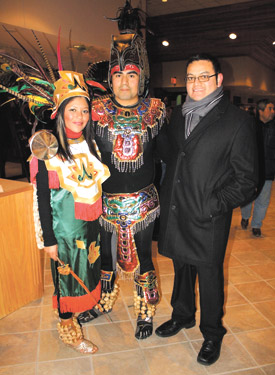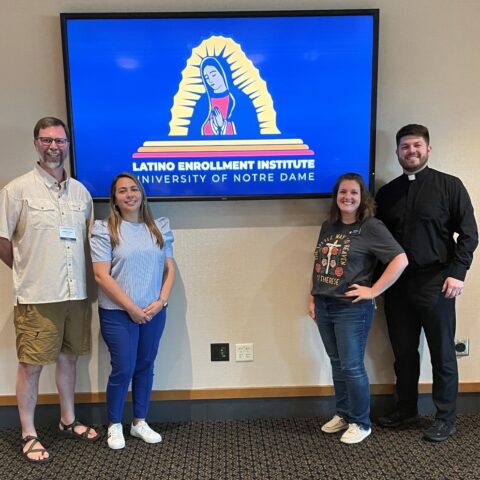ROGERS — Shepherds garner a great deal of air-time during the Christmas season. At no other time of the year does the shepherd figure so prominently into both story and song. The image of the shepherd and analogies comparing Jesus, pastors and ministers to the "Good Shepherd" have become a part of Christian tradition.
Father Juan Manjarrez, 27, associate pastor at St. Vincent de Paul Church in Rogers, understands these comparisons better than many because shepherding has been a way of life for him. Father Manjarrez, serving at his first appointment since his ordination in May, has noticed some similarities of keeping watch over the fields or a pastoral flock.
While growing up in Iripuato, a small village in the state of Guanajuato, Mexico, Father Manjarrez herded goats. The fourth boy of six children, Father Manjarrez began herding with his older brothers at the age of 6 and by the time he was 8, he and his younger brother were a team of two responsible for looking after the herd for the first part of the day.
The family owned one of the largest goat farms in the area, managing as many as 120 goats at one time.
"My older brothers would go to school in the morning and my younger brother and I would go to the mountains with the goats until after lunch," Father Manjarrez said. "My brothers would find us and then we would go back, eat and go to school in the afternoon."
Being a watchful guardian of the field was no small task, according to Manjarrez, because getting the goats to go in the right direction took some persuasion.
"We had slingshots that we would use to shoot rocks in the direction we did not want them to go and there would always be a slow and fast group," he said. "Sometimes we had to ride a donkey to keep up with them, but it was never an option to not care for the goats."
Day in and day out, he and his brother would leave the farm in the morning and head to the mountains walking anywhere from five to 10 miles a day to locate an area where the herd could find food and water. Keeping them all going in the same direction was just one of the challenges, but protecting the herd from other perils was an even tougher job.
"In more dangerous territory we had to watch for the coyotes," Father Manjarrez said. "But we also had to watch after the goats that were pregnant and try to decide if they would have their babies out in the field because then we would have to carry them back home if they did."
Father Manjarrez remembered one particular day when he had to carry four small goat kids back to the farm. He cradled two, while the others were wrapped around his shoulders. He emphasized the value a goat possessed.
"Goats provided food, cheese, milk and, then, income if we sold them," Father Manjarrez said.
In a homily to the school children Dec. 11, Manjarrez related his story of being a shepherd to the reading of the "Good Shepherd" seeking out the one lost sheep.
"As a shepherd when I was a child, we lost several goats, it happened often," he told them. "But I don't think I would have gone looking for one goat, maybe 20," he said. "That tells you what kind of shepherd Our Lord is for us."
Lost parishioners present the same challenges as the lost goats, according to Father Manjarrez. "You have to be very clever in order to find those goats, looking at their tracks and determining when they were made," he said.
Similarly, Father Manjarrez pointed out that looking at the environment of fallen-away Catholics can bring clues.
"We have to know when it is time to be there and be hospitable and lead them back to the flock," he said.
Being a former shepherd has made Father Manjarrez, well, a better shepherd.
"When you care for something, it brings you out of your own self, you learn to think of them before yourself," he said. "When you know your flock, you help them become aware of dangers. For us the Gospel gives us our boundaries. We bring people to the water, meaning the Living Water of Christ."
Several parishioners at St. Vincent de Paul migrated from the same area in Mexico as Father Manjarrez and remember him as the goat herder.
"This is a great connection for them to see me and know that I am here," he said. "I am a part of them, but I was ordained for the whole Church. I am working to become that bridge between the two communities. Just like I had to when I had two groups of goats."
"I don't know why God called me, but you never discount what God's calling is," Father Manjarrez said. "Like David, another shepherd in the Bible, we don't always feel qualified or worthy, but God always knows what he is doing and has a plan."




